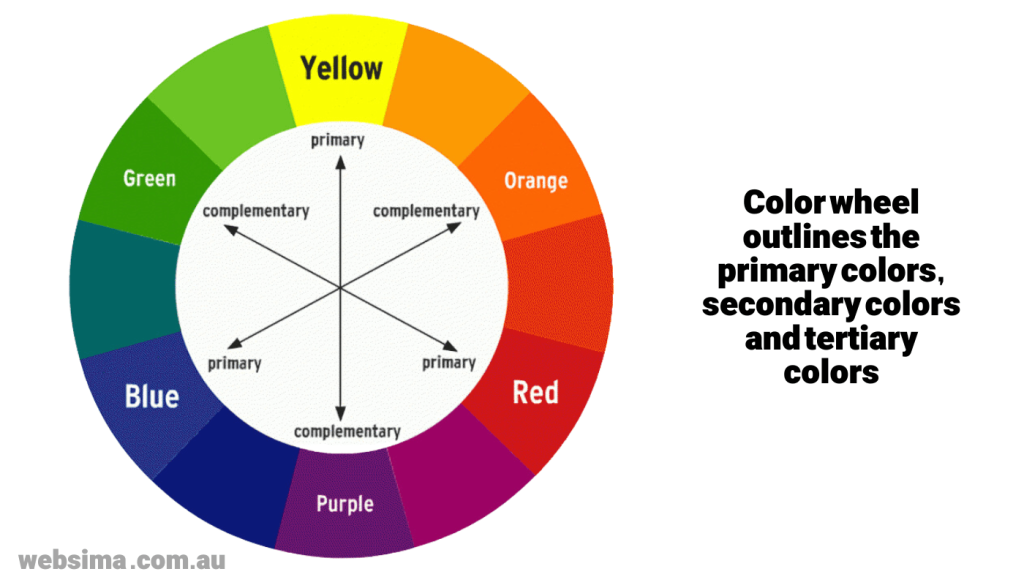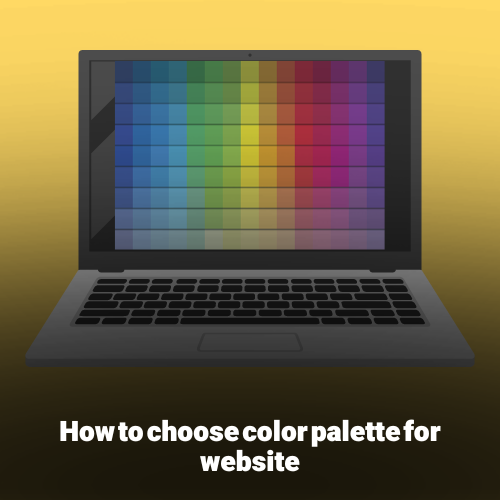Your website is a reflection of your brand and the entire business. It is the visual aspect of your brand, so the design plays a crucial role in attracting customers into your brand. When it comes to website design, colouring is one of the most important components of the design. The colouring must not only be eye-catching to attract users to the website, but also should align with your business branding, logo and more importantly with the type of your business.
What is a website colour palette?

The collection of colours that a designer uses to design a website is called a website colour palette. Depending on the website type and the designer taste, it can be either only a few colours or a wide range of colours, in order to design a visually appealing website.
Colour palette generally contains two main sets of colour. The primary colour is the dominant colour which is used for the background, menus, etc while the secondary colour is used to colour the CTA buttons and other minor elements.
Choosing the right colour palette for a website is one of the most important tasks that must be accomplished with care. Due to limited financial sources, you may want to develop your website by yourself, to arrange for a budget web design in Australia. In this case, be vigilant on choosing the right colour palette for your website, as it plays a pivotal role on user experience and conversion rate.
Why is website colour palette important?
Colours schemes play multiple roles when it comes to website design. Colour palette creates a first impression. The better a colour scheme is chosen, the more pleasing your website’s first impression will be. In addition, a colour palette shapes your visual identity and brand recognition, as it resonates your brand in users’ mind. More importantly, different colours trigger different emotions and feelings in the eyes of visitors that can positively impact user experience and conversion rate.
As such, colour palettes are one of the most important components of your website that can shape your visual identity, brand recognition and trigger special feelings for visitors. From a UX design perspective, the right colour palette for your website is as important as other UX elements such as website loading speed, responsive design, quality content, etc.
How to choose an appropriate colour palette for your website
1- Understand what the colour wheel is

The colour wheel is the basis of colour theory. Colour wheel outlines the primary colours, secondary colours and tertiary colours. There are only three primary colours which are red, blue and yellow. The secondary colours are created by combining the primary colours. Orange, purple and green are secondary colours that are formed by mixing the primary colours. At last the tertiary colours that are formed by mixing one primary and one secondary colour. There are totally six tertiary colours out there; Red-Purple (magenta), Red-Orange (vermillion), Blue-Purple (violet), Blue-Green (teal), Yellow-Orange (amber), Yellow-Green (chartreuse)
2- Get yourself familiar with what feelings every colour triggers
Here is a quick look on what the colours represent and what feeling they trigger:
- Red — Power, passion, or energy, help in making users to take action
- Orange — Joy and enthusiasm, triggers positive and joyful feelings
- Yellow — Happiness and intellect. Never overuse yellow though
- Green — Growth, organic, healthy. It may make users to feel your brand is growing
- Blue — Tranquillity and confidence, depending on the shade – Lighter blue represent peace and darker blue triggers confident feelings
- Purple — Luxury or creativity. sophistication.
- Black — Power and mystery, classic, authoritative
- White — safety and innocence, simplicity, purity.
3- Choose the right colour scheme for your website
Choosing a colour scheme that works for your website is probably the most challenging part. You must understand the type of business and the products or services on offer. According to the business type, your targeted audiences must be identified to predict how they want to see the website. The colour scheme must reflect your brand identity and the business goals, personality and values must be resonating through the selected colours. As such, you must consider the nature of the business, the type of products or services, the preferences of targeted audiences and at last your brand identity, to choose the right colour palette for designing your website
4- Never underestimate the power of colour contrast
Once the colour palette is chosen, you must choose the primary colour of the design which is the most dominant colour. The primary colour accounts for the background colour, logo and main menu. The secondary colour which is used for minor elements such as CTA buttons must be chosen as a complimentary colour. Be careful in choosing these two main colour types to be in contrast against each other, so the website’s important elements stand out and are clearly visible. Most visitors would click away, if they find your content difficult to read.
The process of choosing the colour palette for your website is quite important, as your website’s aesthetically appealing visual would have a positive impact on user experience and conversion rate optimization.
Wrapping up
Designing a website in general and choosing the right colour palette in particular is not easy. Even though with the help of a content management system, the web design process is now easier than before, choosing a colour palette that suits your brand needs a good level of experience, a taste of art and some psychological knowledge to predict the targeted audience’s taste. By following the rules that we have discussed here in this article, you might be able to get the task of your website colour palette done. However, it is always a good idea to seek professional services from an experienced web designer with a proven track record of success.
Websima , with more than a decade of market presence and local and international experience is more than happy to help if you are in need. Feel free to contact us and book for your free consultation meeting to discuss your project further with our talented team.





